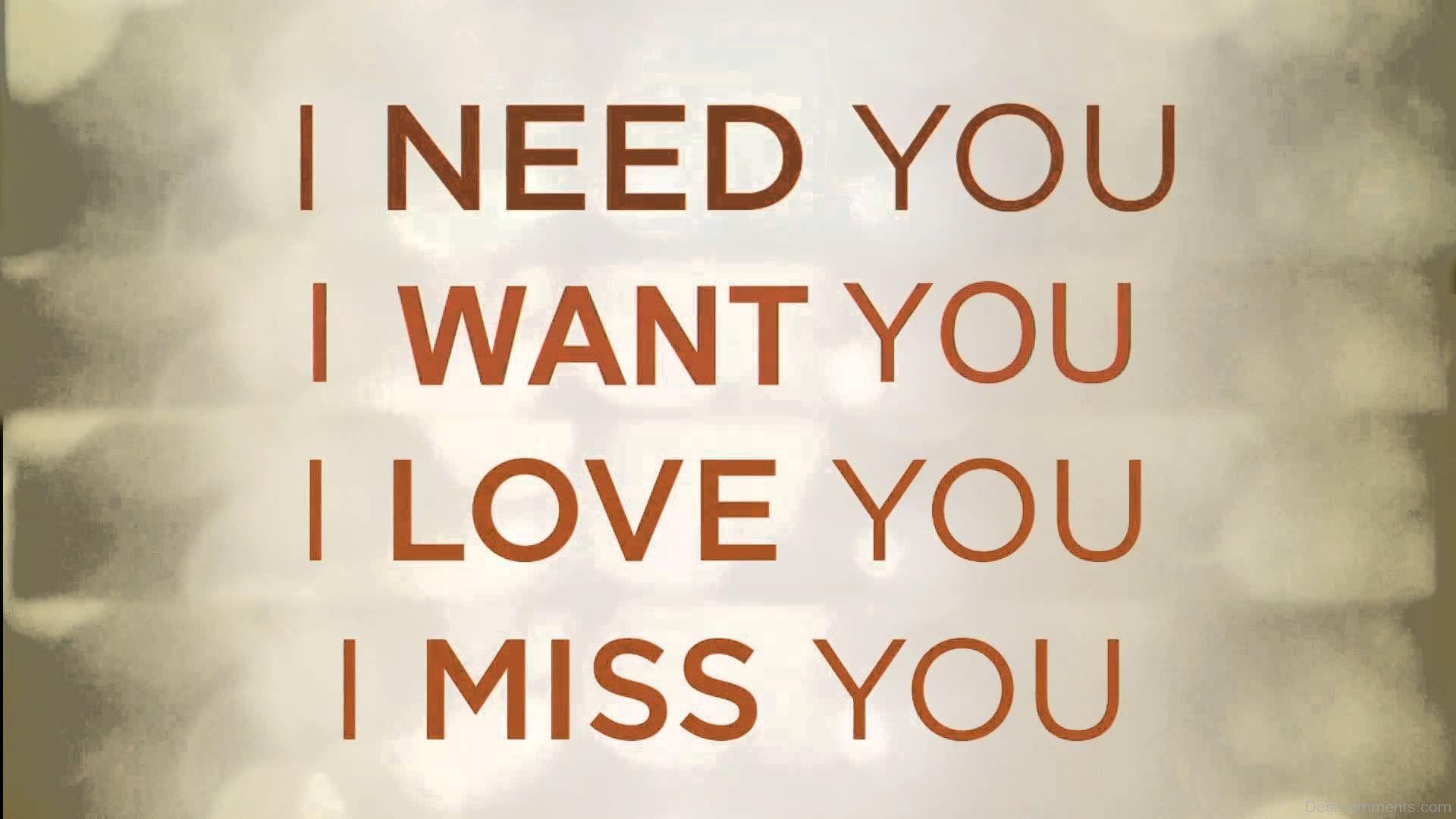In the realm of love and relationships, the phrase "please stay, I want you, I need you" resonates with many individuals who find themselves at a crossroads. It embodies the deep emotional pull towards someone special, amplifying the longing and desire to keep that person close. Whether it’s a romantic partner, a cherished friend, or even family, these words capture the essence of connection and the fear of losing someone who means the world. This article explores the layers of this sentiment, diving into the reasons behind such heartfelt pleas, and the impact they have on our lives.
As we delve deeper into the intricacies of human relationships, we realize that the plea to stay is often rooted in vulnerability. It reflects a longing for stability and reassurance in a world that can sometimes feel chaotic. The desire to hold onto someone we care about can lead to profound moments of intimacy or, conversely, feelings of desperation. Understanding these dynamics can help us navigate our own relationships more effectively, ensuring that we express our needs without overwhelming the other party.
Ultimately, the message of "please stay, I want you, I need you" is universal. It transcends cultural boundaries and speaks to the core of human experience: the need for connection, love, and understanding. As we unpack this phrase, we will consider its implications through various lenses, including psychology, sociology, and personal anecdotes. Join us on this journey as we explore the depths of longing and the beauty of human relationships.
What is the Emotional Weight Behind "Please Stay, I Want You, I Need You"?
The phrase itself carries a significant emotional weight. It can convey desperation, love, or even a sense of helplessness. But what drives us to utter these words? Is it fear of abandonment, a profound love, or perhaps a combination of both? Understanding the emotional undercurrents can help illuminate why we feel compelled to express such deep-seated needs.
How Do Relationships Influence Our Need for Connection?
Relationships play a crucial role in shaping our emotional needs. Whether it's a romantic partner, a close friend, or family, each relationship brings its unique dynamics. The stability and comfort we seek often hinge on the assurance that our loved ones will remain by our side. How do our past experiences shape our present needs? Understanding this can help us articulate our emotions better.
Who Are the People We Most Often Want to Stay?
When we find ourselves pleading for someone to stay, it’s often directed towards individuals who play significant roles in our lives. But who are these people? They could be:
- Romantic partners
- Close friends
- Family members
- Mentors or role models
Each relationship comes with its expectations and emotional investments, leading to varying degrees of attachment and the subsequent longing for connection.
What Are the Impacts of Expressing the Need to Stay?
Expressing a desire for someone to stay can have profound effects on both individuals involved. It can strengthen the bond, providing reassurance and clarity. However, it can also introduce tension or pressure if not expressed thoughtfully. What are the potential outcomes of such conversations?
Can Pleading for Someone to Stay Backfire?
While the intention behind pleading for someone to stay is often rooted in love and desire, it can sometimes lead to unintended consequences. The pressure of such expressions can make the other person feel trapped or overwhelmed. How can we ensure that our expressions of need do not backfire?
What Are Healthy Alternatives to Pleading?
Rather than simply pleading, there are healthier ways to express our needs in relationships. Some alternatives include:
- Open and honest communication about feelings
- Engaging in active listening to understand the other person's perspective
- Creating a safe space for both individuals to express their needs
These alternatives can pave the way for a more balanced and fulfilling conversation about commitment and connection.
How Do Cultural Influences Shape Our Expressions of Need?
Cultural backgrounds significantly influence how we express our emotions and needs. In some cultures, expressing vulnerability is seen as a sign of strength, while in others, it may be viewed as a weakness. How do these cultural differences impact our relationships and the way we communicate our desires?
What Role Does Communication Play in Relationships?
Effective communication is the cornerstone of any healthy relationship. It allows individuals to articulate their feelings and needs clearly. The plea of "please stay, I want you, I need you" can be a catalyst for deeper conversations about commitment and connection. How can we improve our communication skills to express our needs more effectively?
Can Professional Help Improve Our Relationship Dynamics?
Sometimes, the complexities of relationships warrant professional guidance. Couples therapy or counseling can provide a neutral space for individuals to explore their feelings and improve communication. Can seeking professional help assist in articulating our needs without resorting to pleading?
In conclusion, the phrase "please stay, I want you, I need you" encapsulates a universal longing for connection and intimacy. It serves as a poignant reminder of our emotional vulnerabilities and the importance of expressing our needs within relationships. By understanding the underlying emotions, exploring healthy communication techniques, and recognizing the role of culture, we can navigate our relationships with greater clarity and compassion. Ultimately, the plea to stay is not just about holding onto someone; it’s about fostering a deeper connection that enriches both parties involved.
You Might Also Like
Captivating Symbolism: The Allure Of Black Cat TattoosGet Ready For The Excitement: WrestleMania 40 Tickets Are Here!
Kenshi: The Blind Warrior Of Mortal Kombat
Understanding The Divide: Kamala Harris Not Like Us?
Understanding The Unique Meaning Of "Root" In Australia
Article Recommendations
- Mark Sheehan Cause Of Death Cancer
- Liam Payne Rose Tattoo
- Valentina Midget
- Emily Compagno Height And Weight
- Lauren Burch Onlyfans Leak
- Jakob Ulrich
- Lena The Plug Video
- Jaden Smith Diddy
- Liam Payne Favorite Food
- Araksya Karapetyan Age


